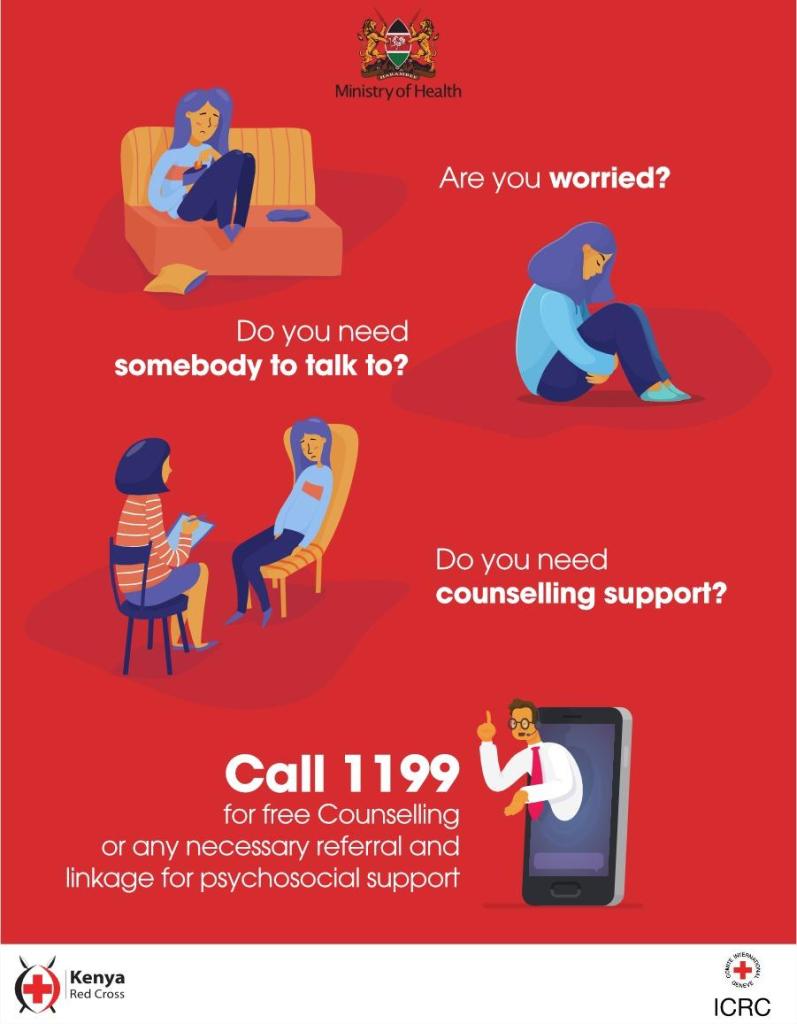Kindly introduce yourself to us.
My name is Bright Shitemi. I am the Founder and Executive Director of Mental 360
What is mental health?
Mental health simply is the ability to cope with the day to day stressors and work productively. More often than not, people will confuse Mental health for Mental illness. Mental illness can then be described as the inability to cope with day to day stresses and be a productive individual. It is a condition that affects a person’s mood, thinking and feelings. There are hundreds of these.
So individuals might have a mental health concern and a mental illness. It becomes an illness when;
- The disruption goes on for an elongated period of time ( 2 weeks to a month +) or
- An individual is rendered outright incapable of engaging productively.
We all have mental health concerns but might not necessarily be mentally ill. We, therefore need to take care that our concerns do not become an illness.
How does the COVID-19 pandemic impact our mental health?
COVID 19 has triggered issues like anxiety, depression, PTSD, suicide ideation and substance abuse for some. As humans, we are naturally social animals and this new situation affects our brains in ways we have never anticipated. Other than that, many are going through a period of economic uncertainty that is leading to chronic stress.
What are the best productive activities that one can engage in at this moment?
At this moment let’s stay productive by creating daily routines that feature healthy eating, physical exercise and connections with family or people in your social circle.
Do we have any mental health hotlines active during this pandemic?
Yes. We have Mental 360 offering support via a helpline for telecounseling and online support through Zoom, Skype or other online platform; and Red Cross.

What measures do you think corporates should employ to manage the anticipated psychosocial effects of Covid-19 on their employees?
I’ll speak to this from the angle of what we are doing to support corporates in this period.
- We now have mental health support packages for companies where staff can get to reach out and access paid-for help so they do not have to spend on mental health services.
- We have prepared mental health talks via webinars to help employees through this period.
Other than that employers should stay connected to their teams via weekly check ins through HR to ensure the employees feel cared for and have an opening for anyone with a challenge to come out.
Some companies are offloading staff, yes, but providing basic items for them to be able to cope with the situation.
What if I get the disease, what should I do?
First, we should all realise that COVID 19 is not a fatal disease. We are seeing over 80% success rate in treatment and again over 80% of people who contract the virus will have mild to no symptoms.
The virus is unfortunately dangerous to those with underlying health conditions and old people. Even for these segments, treatment is accessible and with a high success rate. If you are displaying mild symptoms, quarantine and wait it out. If these symptoms become serious then reach out to the government provided hotlines for hospitalization or rush to the nearest health facility. More importantly wash your hands, wear a mask and avoid contact.
What are the signs of someone who is mentally ill?
Easy to spot signs are loss of concentration, difficulty sleeping or getting out of bed, difficulty maintaining hygiene, violent streaks, sex drive changes, major changes in eating habits, trouble relating to people, suicide ideation and feelings of worthlessness over an extended period of time.
Kindly note that we all experience these things at one point or another but if they persist for long periods then it is time to reach out immediately. It is only a mental health professional who can diagnose you so do not diagnose yourself even in the case the signs persist.
A sure sign that one has a mental illness is detachment with reality otherwise known as psychosis, usually occasioned by an individual hearing voices in their head. Taking care of our mental health is a daily endeavour. Meaning therapy is not just for the mentally ill but for everyone going through a moment. It is when we don’t address the signs when they arise that they may develop into mental illness.
There are also cases of stigma especially on those infected by the virus in our midst. How can we eradicate this stigmatization?
The only way to eradicate stigma is to educate people. We have to take it upon ourselves to seek information. The virus is the `cousin’ of the normal flu and can affect anyone. So there is no need to stigmatize people or even be scared if you get it.
Opening up especially when affected mentally is never easy for many. How can we easen enough to open up to other people that we are mentally ill?
Opening up should be done either anonymously or to people you trust. There are cases of people sharing about their mental health or challenges to random people on the bus and feeling relieved. This is a real option.
Ultimately, if one is in continuous distress mental health professionals are the best option. The sessions are confidential and you do not have to worry about your situation being used against you. Of course, in an ideal world and that’s why organisations like ours exist, there should be zero stigma. Because mental illnesses are just like any other illnesses only that it is the brain involved.

In your experience with your work, how does the corporate world/employment space view mental health? Do they have a place for mental health?
A few corporates are alive to these conversation and are opening up. So that’s a positive. There is still a lot of work to be done though. There is still low literacy levels and high stigma levels at the work place even among well educated persons.
Do you have training programs on mental health? How would an organisation reach you for the same?
Yes we do have trainings and one can reach us via email at info@mental360.or.ke or phone call to 0776543099. Our social media platforms are vibrant and are another avenue for people to reach out.
Ultimately, any final advice for us during this hour of pandemic?
The advice is not to panic. I know it is a period of uncertainty , stress and anxiety but together we will pull out of it. One simple way to go manage your anxiety is to breath. Be intentional in your breathing, take deep breathes fill your stomach with air and exhale for 5-10min. Simple and effective tool to manage anxiety. If overwhelmed, kindly reach out to the helplines. Lastly, stay connected and be compassionate to those around you.










